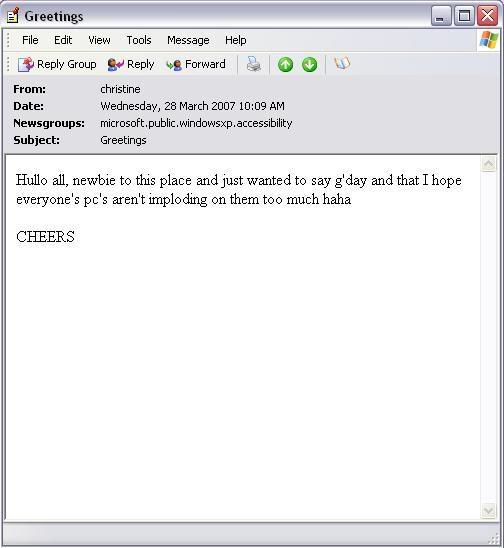ICQ, boy has it been years since i used it or had it on my pc and it's changed alot, for the good by the looks of it also and i'm still familiar with it so an extent so that's good.
Well as requested i downloaded ICQ to my computer and these are my answers to the self test area
1. The ICQ number for the nickname 'advanced net studies' is:
formally it was 257853416 but the newer one is: 337-293-557
2. When you add advanced net studies to your contact list, it:
is not authorised automatically
3. What comment is in the 'about' section of the advanced net studies user info?
I know the self test answer is :
This is the ICQ identity I use just for my advanced Internet use students! -
which I'd say is also for the old one and with the new net studies ICQ # my answer is:
'There is nothing in the about me section'
Wednesday, 28 March 2007
Module 2 Email Tasks - Newsgroups
Up until now i had never used a newsgroup and whilst i can see the advantages i can also see that it's something i do not like so I was less than impressed with it all.
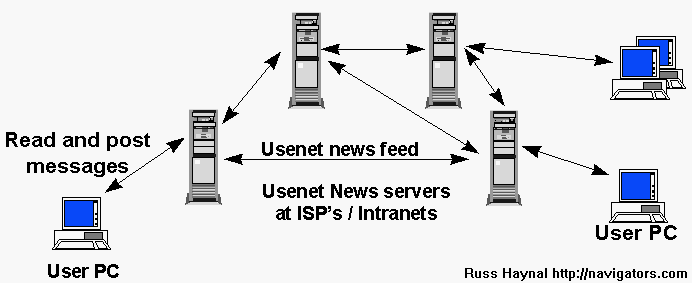
Basically a newsgroup is a continuous discussion in a public arena about a particular topic.
They are also ‘decentralized’ which basically means that the messages are not all kept or maintained on one single server, they are actually copied to hundreds of servers worldwide.
They are good for when you want to chat with more then one person, for instance you want to chat to a group of people who are interested in the same topic such as you are and finally they are good if you are someone that does not need an answer straight away.
They are also ‘decentralized’ which basically means that the messages are not all kept or maintained on one single server, they are actually copied to hundreds of servers worldwide.
They are good for when you want to chat with more then one person, for instance you want to chat to a group of people who are interested in the same topic such as you are and finally they are good if you are someone that does not need an answer straight away.
(Screenshot below of how it works)

Task - Follow your chosen newsgroup for a couple of days, and then post a message to the group. You should be able to see that message shortly thereafter. Now cut and paste a copy of the entire message, including the header information.
(screenshot below)
Friday, 23 March 2007
Module 2 Email Tasks - Email Lists.
An Email list basically is, say a website about parenting, and you can sign up to be a member of its list, what that means is that the members have discussions and the messages are sent to and from your email from one central address from the chosen site.
What are the pros and cons of email lists versus discussion boards?
Email Lists Pro’s & Con’s
What are the pros and cons of email lists versus discussion boards?
Email Lists Pro’s & Con’s
- I’ve found that with email lists I got lost easy and everything is sort of grouped together and not as organised as a discussion board.
- I also found that people go off topic easily which then also adds to the mix and in general I really don’t like email lists at all, thus far.
- I also find it A LOT less personal.
- Because it is delivered directly to you, you don’t miss anything.
- Unfurtunately this also counts for spam
- Another benefit from email lists (groups) is the lists from long ago will still be there you to get to if you have to.
- A lot of the time messages have to be approved so theres a waiting time.
Discussion Forum Pro’s & con’s
- They are big, so occasionally you can completely miss things of interest
- More personal, you end up feeling like you actually know these people in reality.
- People tend to open up more and it’s a friendlier atmosphere.
- Forums are a faster way to communicate and more real time is involved.
- Messages are instantly available.
Are there certain kinds of communication or purposes more suited to one than the other?
- I think for someone that’s time restricted Email Lists would be more suited because it’s delivered right to your email inbox.
- For myself I much prefer that human contact and relax a lot more in a forum/Discussion Board & I like the fact that everything is sorted into it’s own topics/catagories.
Wednesday, 21 March 2007
Module 2 Email Tasks - Email Tutorial
Email tutorial
What information about a user's email, the origin of a message, and the path it took, can you glean from an email message?
Basically I found out that there is two main parts within a users email
· Domain name ( i.e.: curtin.edu.au)
· @
· Username (also known as an e-mail account , an example is my Curtin student email username christine.binns)
The edu is telling us that it’s an educational institution of some kind and the a.u is telling us it’s location, in this case Australia.
In what cases would you find it useful to use the 'cc', 'bcc' and 'reply all functions of email?
I have discovered that ‘cc’ is a tool for allowing me to send a copy of this email to another person/s, other then the original recipient.
I also discovered that ‘bcc’ means that I can also send copies of the email to other person/s without the original recipient knowing that I have..bit sneaky really hehe.
In what ways can you ensure that an attachment you send will be easily opened by the receiver?
Ensure that the person receiving my email as the software on their computer to be able to open it.
If I’m unsure what software they have then sending the document in plain text (ASCII) is a wise idea, that way they can open it.
Note: features such as bold text etc will be lost though.
Also compressing large files by using freeware such as WinZip (or my own XP Extract program is a good way to send files also as they will be smaller and will take less time for the recipient to open them, a link to it placed somewhere on the internet would also be helpful.
What sorts of filters or rules do you have set up, and for what purpose?
I find these days that there is so much Spam going on around the net that I use strong filters such as blocking certain characters (XXX, porn etc) from coming through which works well as I have a young child in my house plus I try to avoid making my pc susceptible to virus’s, but I also check my bulk folders regularly also incase normal mail slips into there which it sometimes can.
How have you organised the folder structure of your email and why?
Yes I have, I get and have set up my Outlook Express to collect my mail from Yahoo and my ISP server so I need to organise certain folders for them all to go into to keep me organised and to reduce clutter.
What information about a user's email, the origin of a message, and the path it took, can you glean from an email message?
Basically I found out that there is two main parts within a users email
· Domain name ( i.e.: curtin.edu.au)
· @
· Username (also known as an e-mail account , an example is my Curtin student email username christine.binns)
The edu is telling us that it’s an educational institution of some kind and the a.u is telling us it’s location, in this case Australia.
In what cases would you find it useful to use the 'cc', 'bcc' and 'reply all functions of email?
I have discovered that ‘cc’ is a tool for allowing me to send a copy of this email to another person/s, other then the original recipient.
I also discovered that ‘bcc’ means that I can also send copies of the email to other person/s without the original recipient knowing that I have..bit sneaky really hehe.
In what ways can you ensure that an attachment you send will be easily opened by the receiver?
Ensure that the person receiving my email as the software on their computer to be able to open it.
If I’m unsure what software they have then sending the document in plain text (ASCII) is a wise idea, that way they can open it.
Note: features such as bold text etc will be lost though.
Also compressing large files by using freeware such as WinZip (or my own XP Extract program is a good way to send files also as they will be smaller and will take less time for the recipient to open them, a link to it placed somewhere on the internet would also be helpful.
What sorts of filters or rules do you have set up, and for what purpose?
I find these days that there is so much Spam going on around the net that I use strong filters such as blocking certain characters (XXX, porn etc) from coming through which works well as I have a young child in my house plus I try to avoid making my pc susceptible to virus’s, but I also check my bulk folders regularly also incase normal mail slips into there which it sometimes can.
How have you organised the folder structure of your email and why?
Yes I have, I get and have set up my Outlook Express to collect my mail from Yahoo and my ISP server so I need to organise certain folders for them all to go into to keep me organised and to reduce clutter.
Tuesday, 6 March 2007
Module 2.1 - Communicating in the Infosphere
This was an interesting read.
Although i am very experienced with all concepts of email i did enjoy finding out little bits of interesting information that i would normally not even think about and was surprised and i found i benifited nicely from it.
Although i am very experienced with all concepts of email i did enjoy finding out little bits of interesting information that i would normally not even think about and was surprised and i found i benifited nicely from it.
Friday, 2 March 2007
Module 1 - Internet Tools (cont)
Using the traceroute tool, answer the following questions:
Traceroute from the chosen site to curtin.edu.au
How many ‘hops’ are there? my answer = 17 hops
what is the average time in milliseconds from the tools site to the curtin server?
my answer = 249ms
134.7.179.10 [curtin.edu.au]
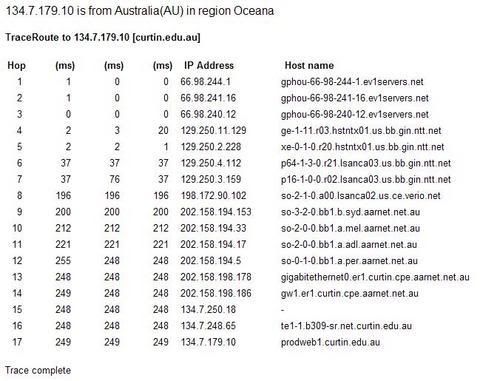
I'm unsure what i am doing wrong, i got it working ok but my results were different from the self test results but on exploration in the webct discussion forum i see alot of others got the same results also.
------------ Further Exploration------------

Now, heres my ping test results from A-ToolBar
number of pings = 5
ip address = 134.7.34.197
host name = 134.7.34.197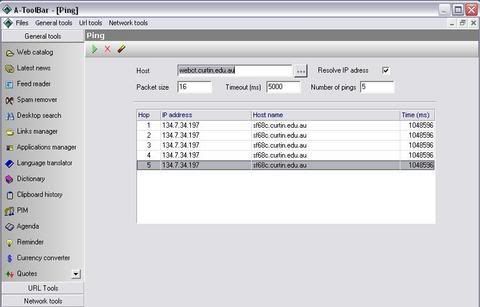
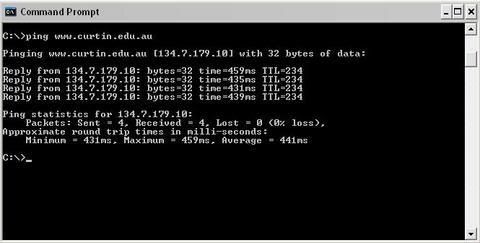
Now if i understand it correctly it took less hops because the A-ToolBar program is on my computer so it took less time to ping then it does from a website, i wasnt sure what to expect & am still far from confident on my thoughts with it but i found it very interesting & i wasnt sure my results would actually be ie: faster or shorter.
Traceroute from the chosen site to curtin.edu.au
How many ‘hops’ are there? my answer = 17 hops
what is the average time in milliseconds from the tools site to the curtin server?
my answer = 249ms
134.7.179.10 [curtin.edu.au]
Below is a screenshot of my results.

I'm unsure what i am doing wrong, i got it working ok but my results were different from the self test results but on exploration in the webct discussion forum i see alot of others got the same results also.
------------ Further Exploration------------
ping test results
Well first up i decided to ping from http://network-tools.com/
The results from this was :
Well first up i decided to ping from http://network-tools.com/
The results from this was :
Ping 134.7.179.10
[curtin.edu.au]
Round trip time to 134.7.179.10: 249 ms
Average time over 10 pings: 249 ms
[curtin.edu.au]
Round trip time to 134.7.179.10: 249 ms
Average time over 10 pings: 249 ms
Screenshot Below

Now, heres my ping test results from A-ToolBar
number of pings = 5
ip address = 134.7.34.197
host name = 134.7.34.197
Screenshot Below

I also upon looking around the internet and realized that i could ping from my Command Prompt box.
Screenshot of results below

Now if i understand it correctly it took less hops because the A-ToolBar program is on my computer so it took less time to ping then it does from a website, i wasnt sure what to expect & am still far from confident on my thoughts with it but i found it very interesting & i wasnt sure my results would actually be ie: faster or shorter.
Module 1 - Internet Tools
This one has me compltely confused, i did it right but my answer didnt come up the same.
I will keep trying.
I will keep trying.
Module 1 - File Transfer Protocol (FTP)
I have never used (to my knowledge anyway LOL) FTP or even been aware to what it actually means/does.
I found the help section actually in the program very useful.
So i know now that basically FTP means it transfers files from my computer (client) to servers & vice versa.
It can publish files to websites
Upload images to websites
Backup files to a remote server
Transer files safely & securely between servers
Move files that are too large for email
And apparently "capilization' matters ;)
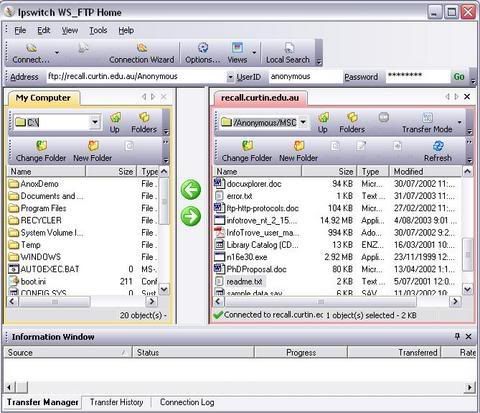
I found the help section actually in the program very useful.
So i know now that basically FTP means it transfers files from my computer (client) to servers & vice versa.
It can publish files to websites
Upload images to websites
Backup files to a remote server
Transer files safely & securely between servers
Move files that are too large for email
And apparently "capilization' matters ;)

Subscribe to:
Comments (Atom)
